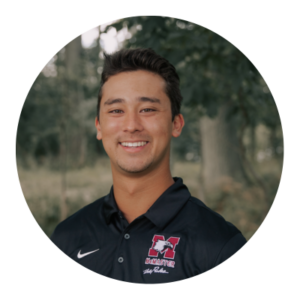 Program: Rehabilitation Science (PhD)
Program: Rehabilitation Science (PhD)
Supervisor: Dr. Ada Tang
Kenny Noguchi is a PhD candidate in the School of Rehabilitation Science at McMaster University. Kenny completed his undergraduate degree in kinesiology and master’s degree in rehabilitation science, also at McMaster University. Kenny is passionate about exercise and improving health outcomes in people living with stroke and older adults. Specifically, his doctoral thesis is examining the impacts of resistance exercise training on physical function in people with stroke. He is also interested in and passionate about mentorship and trainee development, particularly in his roles as co-chair of both the McMaster Institute for Research on Aging Trainee Network Executive Committee and School of Rehabilitation Science Student Council.
Why did you choose to explore research at McMaster University?
McMaster University is a world-renowned research institution, which has a track record for excellence in many areas of health research. I chose to conduct research here to gain exposure to high quality and innovative research in my areas of interest.
What are your career aspirations or plans following completion of your current training?
After my doctoral training, I hope to pursue a successful post-doctoral fellowship in the fields of aging, chronic disease, exercise and/or population health. I am very interested in statistics and research methodology, and aim to learn more in my next stage of training.
What excites you most about your research or what has been the most exciting moment in your (academic) career so far?
I live for the “Ah-Ha” moments. There have been several instances during my coursework that have provided me with information that made research significantly clearer. Specifically, Paul Stratford’s course on advanced statistical analysis gave me confidence in conducting complex analyses. The feeling of successfully learning a complicated topic is very exciting.
Why do you think patient-oriented research is important in the research you are involved in?
From my perspective in exercise therapy, I think that working with community partners and patient-partners is important to understand how our interventions will or won’t work. People with lived experience provide rich insight into feasibility issues or real-world applications of our interventions, which are often times missed when only considering its effect.
What experiences or advice would you like to share with prospective/new trainees?
Learn something new every day. You won’t be able to publish an article or win a scholarship every day, so find enjoyment in learning and building your toolkit, and success/opportunities will find you eventually.
Tell me about someone who has influenced your decision to work in your specific area of research?
My supervisor, Dr. Ada Tang, is a world leader in stroke rehabilitation research. She inspires me to find gaps in the literature and to think of innovative solutions to problems that exist in our field. She has also inspired me to network and collaborate with diverse networks of people, which has helped me immensely as a trainee.
What qualities do you consider important for success in your specific area of research?
I value working with a strong network of people who are kind and willing to collaborate fairly. Good collaborators get the research done, great collaborators make the research fun.
More Info
2022-23 Ontario Graduate Scholarship
2021-22 Rehabilitation Science Publication Award
2021-22 McMaster Institute for Research on Aging Graduate Student Professional Development Award
2020-21 CIHR Institute Community Support Travel Award
Select publications:
Wiley E*, Noguchi KS*, Moncion K, Stratford PW, Tang A. (2022) Sex differences in functional capacity in older adults with stroke: an Analysis of Data from the National Health and Aging Trends Study. Physical Therapy. https://doi.org/10.1093/ptj/pzac077 *= co-first authorship
Noguchi KS, Nguyen L, Mehdipour A, Wiley E, Saunders S, Moncion K, Reid JC, Bakaa N, Garcia Diaz L, Van Damme J, D’Amore C, Kumurenzi A, Lu Z, Knobl E, Beauchamp MK, Macedo LG, Vrkljan B, Moll S, Carlesso C, Letts L, Kho ME, Richardson J. (2022) Undertaking rehabilitation research during and after the COVID-19 pandemic: Emergent strategies from a trainee-faculty workshop. Front. Rehabilit. Sci. doi:10.3389/fresc.2022.881606
Noguchi KS, Moncion K, Wiley E, MacDonald MJ, Richardson J, Roig M, Tang A. (2021) Prolonged elevation of arterial stiffness following peak aerobic exercise in individuals with chronic stroke. Front. Physiol. doi:10.3389/fphys.2021.666171
Noguchi KS, Pryzbek M, Moncion K, McQuarrie A, MacDonald MJ, Tang A. (2020) A history of smoking does not reduce long-term benefits of cardiac rehabilitation on cardiorespiratory fitness in men and women with cardiovascular disease. Appl Physiol Nutr Metab. 2020;10.1139/apnm-2020-0349. doi:10.1139/apnm-2020-0349
MIRA Trainee Grant Writing Workshop
Supervisors: Dr. Ada Tang, Dr. Gésine Alders, Audrey Patocs
Funded by a McMaster Institute for Research on Aging (MIRA) Planning Grant, graduate students and post-doctoral fellows in the MIRA Trainee Network are engaging in a grant writing workshop. Over the course of 6 months, trainees will engage in presentations and workshops, and have an opportunity to write a mock project grant to build grant writing self-efficacy.
